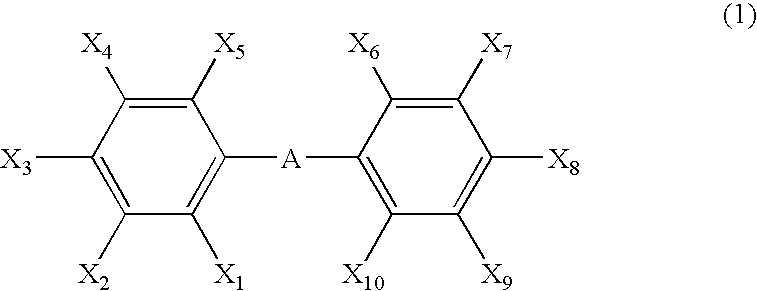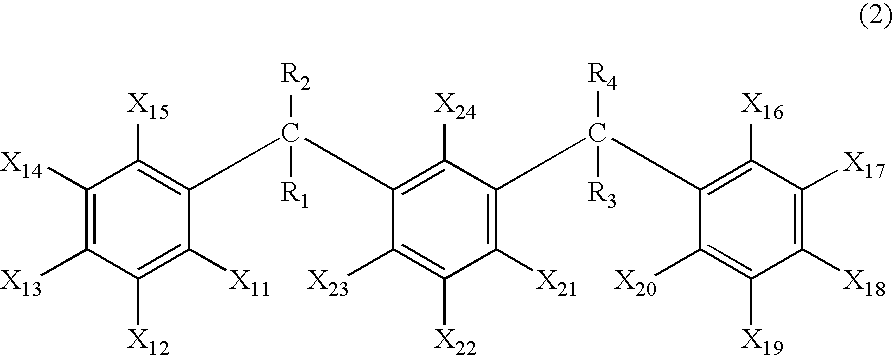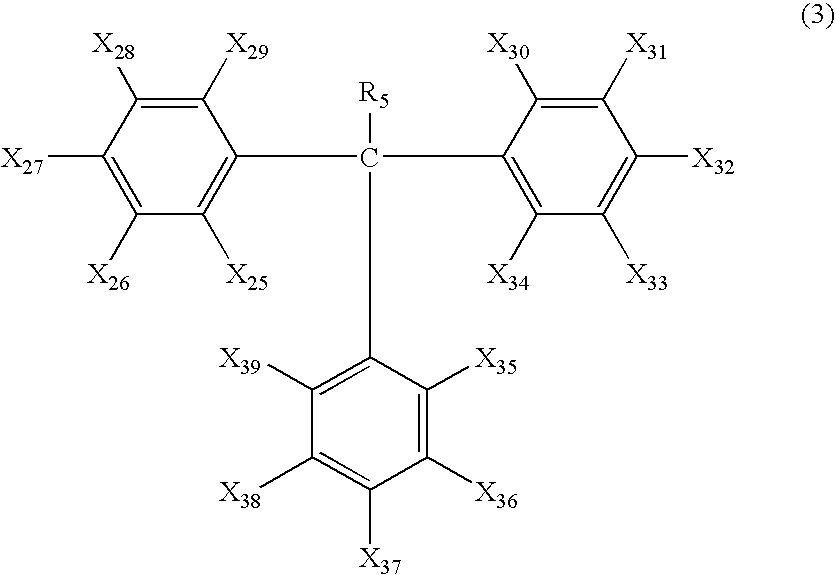Composition for forming photosensitive dielectric material, and transfer film, dielectric material and electronic parts using the same
a dielectric material and photosensitive technology, applied in the direction of photosensitive materials, instruments, photomechanical equipment, etc., can solve the problems of high dielectric loss, difficult to obtain a dielectric using such conventional methods, deterioration of multi-layer printed circuit boards, etc., and achieve low dielectric loss, high dielectric constant, and high dimensional precision
- Summary
- Abstract
- Description
- Claims
- Application Information
AI Technical Summary
Benefits of technology
Problems solved by technology
Method used
Image
Examples
examples
[0380] The present invention will be hereinafter described in detail by the following Examples, but it should be construed that the invention is in no way limited to those Examples. Hereinafter, "parts" and "%" are by mass unless otherwise mentioned.
[0381] The mass-average molecular weight (Mw) is in terms of polystyrene measured by a gel permeation chromatography (GPC) using a chromatograph HLC-802A (available from TOSOH CORPORATION).
[0382] Patterning properties and dielectric properties of the dielectric patterns were evaluated as follows.
[0383] (Patterning Properties)
[0384] In each Example and Comparative Example, measurements were carried out for the width and height of the obtained dielectric pattern with a scanning electron microscope (SEM) to evaluate the accuracy of pattern width as "AA" for the width of 500.+-.10 .mu.m and "BB" for others. Also, deletion of pattern was visually evaluated as "AA" for non-deletion and "BB" for deletion.
[0385] (Dielectric Constant, Dielectric ...
examples 1-5
[0421] (1) Preparation of Photosensitive Composition for Forming Dielectric
[0422] The inorganic particles (A), phenolic resin (B1), phenolic compound (b1), quinonediazide compound (C1), curing agent (C2), acid generator (C3) and crosslinked fine particles (C4) were dissolved in the solvent (D) in the mixing ratio listed in Table 1. The solution was kneaded in a bead mill and thereafter filtered through a stainless steel mesh (500 mesh) and a filter having a pore size of 1 .mu.m to prepare a photosensitive composition for forming a dielectric.
[0423] (2) Application of Photosensitive Composition for Forming Dielectric
[0424] The above photosensitive composition was applied by a spinner onto a Cu-sputtered silicon water. The applied composition was dried at 100.degree. C. for 5 minutes to remove the solvent. As a result, a photosensitive dielectric layer was formed in a thickness of 1 .mu.m.
[0425] (3) Photoexposure and Development of Dielectric Layer
[0426] The photosensitive dielectric ...
synthesis example 1
[0447] A flask purged with nitrogen was charged with 459.0 g of a diethylene glycol dimethyl ether solution in which 9.0 g of 2,2'-azobisisobutyronitrile had been dissolved. Further, 22.5 g of styrene, 45.0 g of methacrylic acid, 67.5 g of dicyclopentanyl methacrylate and 90.0 g of glycidyl methacrylate were added thereto. Then the mixture solution was stirred slowly, and the solution was heated to 80.degree. C., maintained at this temperature for 5 hours and heated at 90.degree. C. for 1 hour to complete the polymerization.
[0448] The solution obtained by the above reaction was added dropwise to a large quantity of water to solidify the reaction product. The reaction product was washed with water, redissolved in 200 g of tetrahydrofuran, and resolidified in a large amount of water. This operation through redissolution to resolidification was repeated three times. Thereafter, the resultant solidified product was vacuum dried at 60.degree. C. for 48 hours to yield a copolymer (I).
PUM
| Property | Measurement | Unit |
|---|---|---|
| mean particle diameter | aaaaa | aaaaa |
| mean particle diameter | aaaaa | aaaaa |
| dielectric constant | aaaaa | aaaaa |
Abstract
Description
Claims
Application Information
 Login to View More
Login to View More - R&D
- Intellectual Property
- Life Sciences
- Materials
- Tech Scout
- Unparalleled Data Quality
- Higher Quality Content
- 60% Fewer Hallucinations
Browse by: Latest US Patents, China's latest patents, Technical Efficacy Thesaurus, Application Domain, Technology Topic, Popular Technical Reports.
© 2025 PatSnap. All rights reserved.Legal|Privacy policy|Modern Slavery Act Transparency Statement|Sitemap|About US| Contact US: help@patsnap.com



